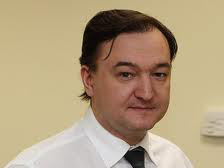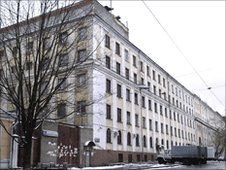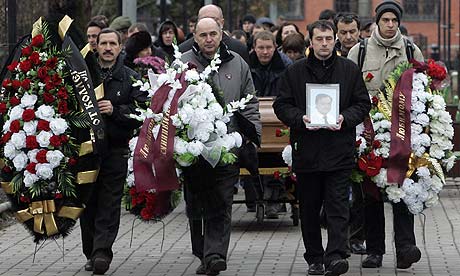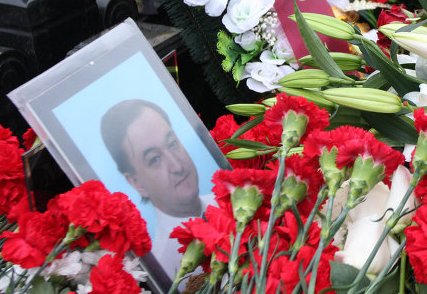 – The case is worth our continued attention, Secretary General Bjørn Engesland says, in its own merit, but also because it provides a deeply disturbing example of how little protection the Russian Federation can provide to those who fight for justice.
– The case is worth our continued attention, Secretary General Bjørn Engesland says, in its own merit, but also because it provides a deeply disturbing example of how little protection the Russian Federation can provide to those who fight for justice.
“The Norwegian Helsinki Committee welcomes the suggestion from the US Senate to introduce visa bans for the law enforcement officers involved in the death of Sergey Magnitsky,” says Bjørn Engesland, Secretary General of the Norwegian Helsinki Committee, “and we encourage Norway to do the same”.
Offenders became heroes?
In the Russian Federation, on the Day of police, on 10th of November 2010, the officers from the Interior Ministry who were involved in Magnitsky’s death were officially recognized for outstanding service. Major Pavel Karpov, whom Magnitsky identified as guilty of theft, was also recognized.
Sergey Magnitsky claimed to have documented embezzlement of 5.4 billion rubles (around 230 million USD) from the Russian budget, the amount paid in taxes by the companies of the Hermitage Fund to the Russian state in 2006.
Hermitage capital delivered a 255-page complaint with the request to start criminal proceedings. Sergey Magnitsky testified against two officers from the Interior Ministry, Lt. Colonel Artem Kuznetsov and Major Pavel Karpov who were directly involved in the theft.
One month later, on November 24, 2008, Sergey Magnitsky was arrested himself, by the same police officers he testified against, charged with being the director of two Hermitage fund companies that allegedly underpaid taxes in 2001.
As the representatives from the Hermitage Fund put it, “Sergey was neither a director nor had any other role at those two companies in 2001, so he couldn’t have had any legal responsibility for taxes, underpaid or not”.
One year without trial
Sergey was kept first in Butyrka prison and then was transferred to Matrosskaya Tishina pre-trial center. Totally Magnitsky spent around one year in detention without trial.
During the year Sergey Magnitsky spent in the prisons, he experienced tough pressure from the law enforcement officers, who demand that Sergey withdrew the testimony against them, moreover, the officers wanted him to take responsibility for the theft of 230 million USD which were stolen by them.
On September 11, 2009, Sergey wrote to the investigator: “My criminal persecution has been ordered, to serve as a retribution … It is impossible to justify the charges brought against me, as I assert again that I did not commit any offenses, and the documents collected by the investigators only prove my innocence … If this case is ever heard in court, these experts will simply be unable to justify their conclusions during cross-examination by the defense… Realizing the invalidity of their claims, the investigators have arranged for physical and psychological pressure to be exerted upon me in order to suppress my will and to force me to make accusations against myself and other persons … in exchange for a suspended sentence and freedom. Every time I reject these propositions by the investigators pushing me to commit such a base act, the conditions of my detention become worse and worse … The administration of detention centers has assisted the investigators to organize my persecution by creating intolerable conditions for me in their facilities.”
Sergey Magnitsky was not allowed to communicate with his children, see his fami ly or receive medical help.
ly or receive medical help.
Magnitsky described his conditions in one of his so-called “letters from the prison”: My participation in court hearings is accompanied by cruel and degrading treatment. On the days when there are hearings, I leave my cell at 7 a.m. and return no earlier than 11 p.m. I get no hot food on those days. I am transported to the court in a vehicle that has 4 square meters and often holds 17 or 18 prisoners, and I must spend several hours in that vehicle. Prisoners returning from the court are not immediately sent to their cells but can be kept for hours in holding cells. In one of these cells, there are no windows or ventilation. There is no drinking water and no normally functioning toilet. After each court appearance, I must spend at least 1 1/2 to two hours in such conditions. These cells are about 20-22 square meters but often hold 70 people at one time. And many of them smoke, meaning that it is impossible to breathe.
Believed in rule of law
Sergei Magnitsky’s case became known not only because he worked for an international investment company which decided to fight for their interests in the Russian Federation despite pressure from the corrupted policemen, but also because Sergey Magnitsky believed that it was possible to change the system in the Russian Federation by means of law.
To his international colleagues, the treatment of Magnitsky by the authorities was shocking. However, the treatment of Magnitsky is unfortunately not exceptional in today’s the Russian Federation.
The case of Magnitsky  illustrates the relationship between business and law enforcement, and the level of corruption, as well as shedding light on the prison conditions in the Russian Federation.
illustrates the relationship between business and law enforcement, and the level of corruption, as well as shedding light on the prison conditions in the Russian Federation.
Magnitsky is not the only businessman imprisoned in the Russian Federation the basis of fabricated accusations and other procedural irregularities – the most famous of them is Mikhail Khodorkovsky.
Warning to Norwegian investors
Still, international companies, including Norwegian companies, invest in the Russian Federation and continue to do business in a system dominated by corruption and with weak legal safeguards.
The case of Magnitsky demonstrates that promoting rule of law is in the interest of business, and not only human rights organizations.
Under the current system, any international company could end up in the same situation as Hermitage Capital. Corruption is the major barrier for developing a healthy investment climate in the Russian Federation.
Hermitage Fund has appealed to different Western parliaments with a request to commemorate Sergey Magnitsky. The Norwegian Helsinki Committee remembers him today and will continue to follow his case.
Find out more about Sergey Magnitsky’s case here (The Economist), here (BBC) and here (The Washington Post).
HRH Oslo, based on Norwegian Helsinki Committee information.
Related links:
Norwegian NGOs showed solidarity with Russian pro-democracy movement
-Human rights are also on the agenda, Mr President
Is Medvedev’s Russia moving towards democracy?
Russian human rights groups in Moscow in the searchlight of the Prosecutor’s Office





